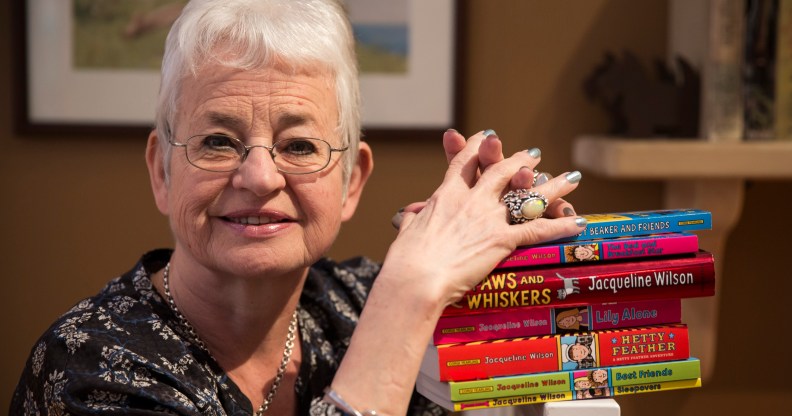Jacqueline Wilson ‘worried’ about kids undergoing gender reassignment

Jacqueline Wilson said she wouldn’t write a novel about a transgender child unless there was good reason to.(Dan Kitwood/Getty)
Famous children’s author Jacqueline Wilson, best known for her Tracy Beaker books, has revealed that the thought of kids undergoing gender reassignment treatment makes her “very worried.”
The 73-year-old children’s author told The Daily Telegraph that it was unlikely she would feature a transgender character in any upcoming novels unless there was a “really strong reason” to do it.
“If you’re a young child it’s not a question of just having bits of you lopped off.”
— Jacqueline Wilson
“I wouldn’t want people to think I’d jumped on the bandwagon just because it’s current and in the news,” Wilson said while discussing the backlash against John Boyne’s recent novel about a transgender teenager.
Jacqueline Wilson on gender reassignment surgery
Despite often covering fairly serious issues in her novels — her 1998 book Girls under Pressure is about a girl with a serious eating disorder — Wilson says gender reassignment isn’t to be “taken lightly.”
“If only everybody could be and act exactly the way they want to but not actually try to change themselves physically, I think that would be easier,” Wilson explained.
“We still have a strange way of putting girls and boys into different slots… I wish we could come to a stage when anybody who fancied could wear a dress and do so-called ‘girly’ things or anyone who wanted could wear jeans and tinker with car engines.”

Jacqueline Wilson has written over 100 children’s books. (Dan Kitwood/Getty)
However, Wilson expressed concern about children undergoing medical intervention for gender dysphoria.
“Some people, right from the time that they are toddlers, are aware that something is wrong and they wish that they could be the other sex. But I’m also aware that some children feel strongly for a while and then they change their minds,” said the author.
“Where I would be very, very worried is young children taking any kind of drugs, hormones or whatever, the long term effects of which we don’t know.”
Children treated for gender dysphoria under the NHS are usually treated with psychological help from specialised gender identity clinics. Hormone therapy, meanwhile, is usually only given to children who have reached puberty and only after comprehensive assessments have been made by a child’s multi-disciplinary team of medical experts.
These hormonal treatments, gonadotrophin-releasing hormone (GnRH) analogues, are considered fully reversible.
Wilson continued that she has apprehensions about reassignment surgery among children, though, surgical intervention is reserved for people aged 17 and above, who are referred to a specialised adult gender identity clinics. Surgery is usually only available on the NHS after completing psychological and hormone treatment, and after living in your gender identity socially for one year.
“If you’re a young child it’s not a question of just having bits of you lopped off. It’s really serious, difficult surgery which can have pretty devastating consequences, I would imagine,” said Wilson.
“I think it’s a decision that has to be left a while until you are utterly mature and utterly certain you know all the actual consequences,” Wilson added.
Wilson also appeared to acknowledge the backlash she may receive for her comment, adding: “Everybody has such strong opinions and whatever you say – as the police expression has it – can be taken down and used as evidence against you.”

